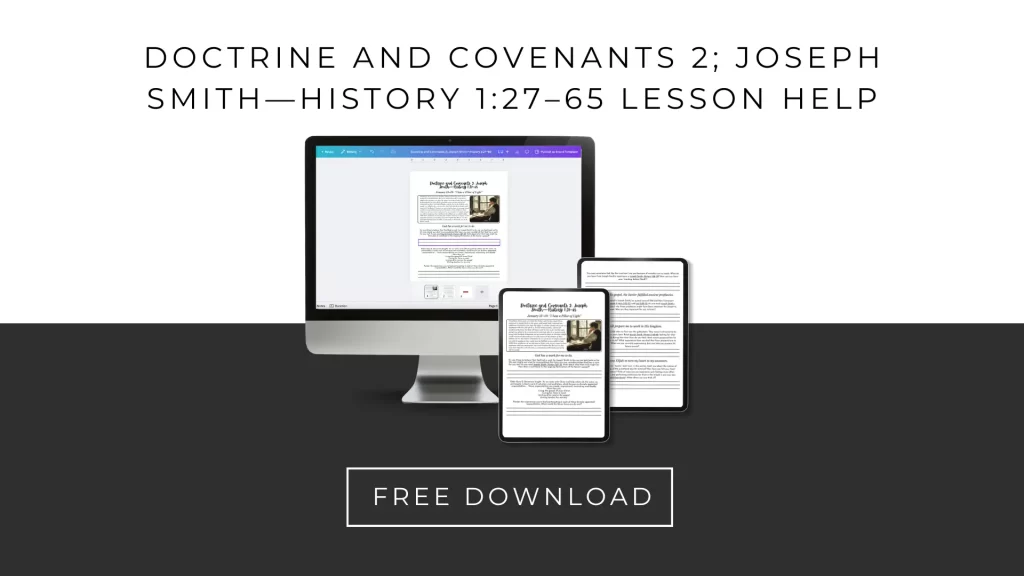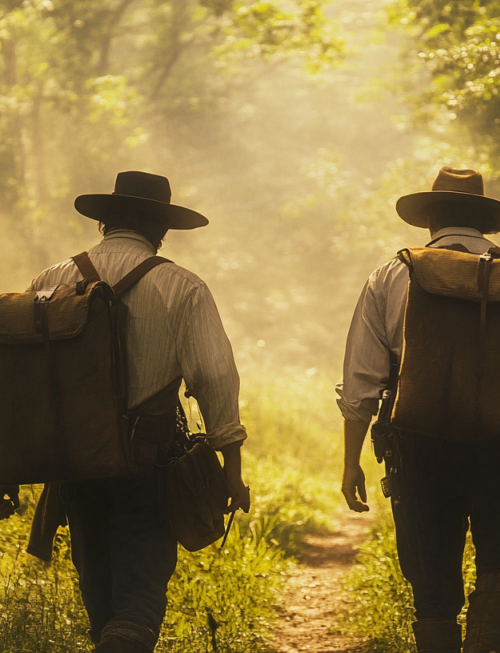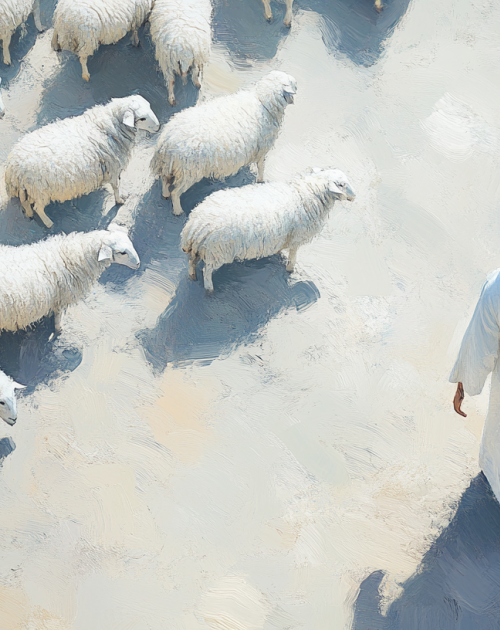
In this post, we’ll be diving into Doctrine and Covenants 2; Joseph Smith—History 1:27–65. To access our free Lesson Help PDF and Canva Template, click here: https://otherthanamom.myflodesk.com/dc2andjst127-65

God has a work for me to do.
Engaging Questions:
- As you read Joseph Smith—History 1:27–33, what do you feel might be the work God has for you to do? How can it contribute to the ongoing Restoration?
- How does Elder Stevenson’s list of divinely appointed responsibilities resonate with you? Which one feels most relevant to your life right now?
- What experiences have you had with living the gospel, caring for others, inviting others to receive the gospel, or uniting families for eternity? How did those experiences impact you?
- Joseph Smith was young and imperfect, yet God called him to do great things. How does his story help you see your own potential to do God’s work?
- What do you learn from Joseph Smith—History 1:28–29 about overcoming mistakes and moving forward in faith?
- Have you ever felt unsure of your standing before God? What practices or experiences help you feel closer to Him and aligned with His will?
- What talents or opportunities do you feel God has given you to help with His work of salvation and exaltation?
- What challenges might keep you from fulfilling the work God has for you? How can you overcome them?
- How can you help someone else recognize their role in God’s plan and encourage them to fulfill it?
- If the Savior asked you, “What would you have me do next?” what would your answer be, and how can you start working toward it today?
Object Lessons:
1. The Puzzle Piece (Unique Contributions)
Materials Needed: A single puzzle piece and a partially completed puzzle or a picture of one.
Show the single puzzle piece and explain how it might seem insignificant on its own, but it is essential to completing the puzzle. Compare this to how each person has a unique role in God’s work. Just as Joseph Smith was prepared to play his part, we are all given talents and opportunities to contribute to God’s plan.
Lesson: God has a unique and important work for each of us to do, and our efforts contribute to His greater plan.
2. The Clay and the Potter (Molded for a Purpose)
Materials Needed: A lump of clay and a small finished pot or sculpture.
Show the lump of clay and explain how, in its current form, it isn’t yet useful for its purpose. Through shaping and refining, the potter creates something beautiful and functional. Compare this to how God works with us, including our weaknesses, to shape us into instruments for His work.
Lesson: God can use our experiences, strengths, and even weaknesses to prepare us for the work He has for us to do.
3. The Toolbox (Different Tools for Different Jobs)
Materials Needed: A toolbox with various tools.
Show the tools and explain how each has a specific purpose. Discuss how God calls each of us to use our unique talents and abilities to build His kingdom. Just as no tool is unimportant in a well-equipped toolbox, no person is insignificant in God’s work.
Lesson: Everyone has a role in God’s work, and our individual strengths are needed to accomplish His purposes.
4. The Lamp and the Oil (Preparation for God’s Work)
Materials Needed: A lamp or flashlight and oil or batteries.
Demonstrate how the lamp doesn’t work without oil or batteries. Compare this to how Joseph Smith was prepared through his experiences, repentance, and willingness to serve. Discuss how we need spiritual preparation—prayer, scripture study, and obedience—to fulfill our roles in God’s work.
Lesson: To do God’s work, we must prepare spiritually and be ready to respond when He calls.
5. The Bridge (Connecting Others to Christ)
Materials Needed: A picture or model of a bridge.
Show the bridge and explain how it connects two places that would otherwise remain separate. Compare this to our role in God’s work: helping others come unto Christ and receive the blessings of His gospel.
Lesson: God calls us to be bridges, connecting others to Him through love, service, and sharing the gospel.
Personal Sharing Prompts:
- Think of a time when you felt a prompting to do something specific for someone else. How did acting on that prompting help you feel that God has a work for you to do?
- Think of a time when you felt inspired to share the gospel with someone. How did that experience teach you about your role in God’s ongoing work of salvation?
- Think of a time when you helped care for someone in need. How did that experience help you feel that you are part of the Savior’s work of love and service?
- Think of a time when you participated in family history or temple work. How did that experience strengthen your testimony of uniting families for eternity?
- Think of a time when you were asked to fulfill a calling or responsibility that seemed overwhelming. How did the Lord help you accomplish His work in ways you didn’t expect?
- Think of a time when you felt inadequate because of past mistakes but still felt the Lord call you to serve. How did trusting in His forgiveness and grace help you move forward?
- Think of a time when you felt that your everyday efforts—like teaching your family, being kind to a stranger, or offering a prayer—were part of God’s greater work. How did that realization change the way you see your role in the Restoration?
- Think of a time when you experienced joy or fulfillment while helping someone come closer to Christ. How did that experience strengthen your testimony that God works through you to bless others?
- Think of a time when you felt guided by the Spirit in a decision or action. How did that experience affirm that God has specific ways for you to contribute to His plan?
- Think of a time when you studied or prayed to understand your purpose in life. How did the Lord reveal what He wants you to do, and how has that helped you move forward with faith?
By restoring His gospel, the Savior fulfilled ancient prophecies.
Engaging Questions:
- What do you think it meant to Joseph Smith to hear Moroni quote ancient prophecies? How might it have helped him understand his mission?
- Why do you think Moroni emphasized prophecies like Isaiah 11, Acts 3:22–23, and Joel 2:28–32? How do they connect to the Restoration?
- What do these prophecies teach you about the role of the Savior in the Restoration of the gospel?
- How does knowing that ancient prophets foretold the Restoration strengthen your testimony of Joseph Smith’s mission?
- What parallels do you see between the prophecies Moroni quoted and the challenges or opportunities we face today?
- How have you seen the fulfillment of Joel’s prophecy that God would pour out His Spirit in the latter days?
- What do these prophecies teach you about your role in helping to fulfill the work of the Restoration?
- If you could ask Moroni why he chose these specific prophecies to share with Joseph, what would you ask and why?
- Why is it important for you to understand the connection between the Restoration and ancient prophecies?
- How do these prophecies inspire you to trust in God’s plan and participate in His work today?
Object Lessons:
1. The Seed and the Fruit (Promises Fulfilled)
Materials Needed: A seed and a piece of fruit (or picture of a fully grown tree).
Show the seed and explain that it represents ancient prophecies. The fruit represents the Restoration of the gospel, which fulfills those prophecies. Discuss how the growth process takes time and care, just as the fulfillment of prophecies requires preparation and God’s timing.
Lesson: Just as a seed grows into a tree that bears fruit, the Savior fulfilled ancient prophecies through the Restoration of the gospel.
2. The Map and Destination (Prophecies as a Guide)
Materials Needed: A map with a marked destination.
Show the map and explain how it leads to a specific destination. Compare this to how ancient prophecies pointed toward the Restoration. When the destination (the Restoration) was reached, it confirmed the accuracy and importance of the map (the prophecies).
Lesson: Ancient prophecies are like a map, guiding us to understand God’s plan and helping us recognize the fulfillment of His promises.
3. The Thread in a Tapestry (Connecting Prophecies to the Restoration)
Materials Needed: A piece of cloth or tapestry with threads visible.
Point out how each thread contributes to the overall design. Explain that ancient prophecies are like threads woven into God’s plan. The Restoration of the gospel brings the design into full view.
Lesson: Prophecies are interconnected in God’s plan, and the Restoration reveals the beautiful fulfillment of those promises.
4. The Candle and the Sunrise (Greater Light Through Fulfillment)
Materials Needed: A candle and a picture of a sunrise.
Light the candle and explain that it represents the light of ancient prophecies, which provided hope and guidance. Show the picture of the sunrise, symbolizing the Restoration as the greater light that fulfills those prophecies.
Lesson: Prophecies gave glimpses of God’s plan, but the Restoration brought the full light of truth to the world.
5. The Builder’s Blueprint (God’s Plan Fulfilled)
Materials Needed: A blueprint or drawing of a completed building.
Show the blueprint and explain how it represents ancient prophecies outlining God’s plan. Compare the completed building to the Restoration, which fulfilled the divine “blueprint” given through prophets.
Lesson: The Restoration of the gospel is the fulfillment of God’s plan as outlined in ancient prophecies.
Personal Sharing Prompts:
- Think of a time when you realized how a prophecy in the scriptures had been fulfilled. How did that deepen your faith in the Restoration and the Savior’s role in fulfilling God’s promises?
- Think of a time when you felt inspired while reading or hearing about an Old or New Testament prophecy. How did learning about its connection to the Restoration strengthen your testimony?
- Think of a time when you recognized how the Restoration brought greater meaning to a scripture you had read before. How did understanding its fulfillment help you see God’s plan more clearly?
- Think of a time when you felt the significance of temple work and family history in your life. How does knowing that the hearts of the children are turning to their fathers fulfill the prophecies Moroni shared?
- Think of a time when you witnessed someone accept the gospel or make a covenant with God. How did that experience remind you of the gathering of Israel as foretold by ancient prophets?
- Think of a time when you felt the Spirit while studying about the Restoration and its connection to past prophecies. How did that experience strengthen your confidence in God’s promises for the future?
- Think of a time when you saw evidence of the gospel being preached throughout the world. How did witnessing or participating in missionary work help you feel a part of the Savior’s fulfillment of prophecy?
- Think of a time when you faced uncertainty but were reassured by the knowledge that God’s promises will be fulfilled. How did reflecting on the Restoration and ancient prophecies bring you peace?
- Think of a time when you shared with someone how the Restoration fulfills prophecies from the Bible. How did their response or your own reflection increase your testimony of the Savior’s work?
- Think of a time when you felt personal hope or encouragement from knowing that the Savior’s work continues to fulfill God’s promises. How does this knowledge help you face the challenges of the latter days with faith?
God will prepare me to work in His kingdom.
Engaging Questions:
- What stood out to you about Joseph Smith’s experiences during the four years before he received the gold plates (Joseph Smith—History 1:48–60)? How do you think these events prepared him?
- Why do you think God waited four years before entrusting Joseph with the plates? What does this teach you about patience and preparation?
- What experiences in your life have helped prepare you to serve God, even if you didn’t realize it at the time?
- What lessons can you learn from Joseph Smith’s persistence in visiting the Hill Cumorah each year, even though he wasn’t yet ready to receive the plates?
- How can you trust that your current challenges or experiences are preparing you for the work God has for you?
- Joseph received guidance from Moroni each year. How has God provided you with guidance or mentors to prepare you for your responsibilities?
- What role do small, daily efforts play in preparing for larger responsibilities in God’s kingdom? How can you improve in this area?
- How can Joseph’s story help you remain patient and faithful when God’s timing doesn’t match your expectations?
- What opportunities do you have right now to prepare for future service, whether in your family, Church, or community?
- If you could ask Joseph Smith one question about his preparation to receive the plates, what would it be, and why?
Object Lessons:
1. The Polished Rock (Preparation Takes Time)
Materials Needed: A rough rock and a polished stone or gem.
Show the rough rock and explain how it takes time, pressure, and effort to transform it into a polished gem. Compare this to Joseph Smith’s preparation before receiving the gold plates. God used experiences over four years to refine Joseph, just as He prepares us through challenges and growth.
Lesson: God uses time and experiences to shape us into who we need to be for His work.
2. The Farmer’s Field (Planting and Growth)
Materials Needed: A handful of seeds and a small potted plant.
Show the seeds and explain that planting them doesn’t immediately yield fruit. Growth takes time, nurturing, and care, just as Joseph’s preparation took patience and persistence. The plant represents how small beginnings lead to meaningful growth when we allow God to guide us.
Lesson: God’s work in us often begins as small steps of preparation, leading to greater opportunities to serve.
3. The Tool and the Sharpening Stone (Readiness for Service)
Materials Needed: A dull tool and a sharpening stone or picture of one.
Show the tool and explain that it cannot fulfill its purpose until it is sharpened. Compare this to how God allowed Joseph Smith to face trials and grow spiritually to prepare for his role in the Restoration. Similarly, we are “sharpened” through learning, experience, and faith.
Lesson: God allows us to experience challenges to prepare us for His purposes, just as tools are refined for their tasks.
4. The Ladder (Step-by-Step Growth)
Materials Needed: A small ladder or a picture of one.
Show the ladder and explain how climbing it requires taking one step at a time. Compare this to Joseph’s preparation for receiving the gold plates, where each year brought new lessons and growth. Emphasize that God prepares us step by step for greater service.
Lesson: God’s preparation often comes in small, incremental steps that build upon one another.
5. The Baking Process (Prepared for a Purpose)
Materials Needed: Ingredients for bread (flour, water, yeast) and a loaf of bread.
Show the raw ingredients and explain that each on its own isn’t enough to make bread. The preparation process—mixing, kneading, and baking—is essential. Compare this to how Joseph’s experiences prepared him for the work of the Restoration.
Lesson: God combines our experiences, even difficult ones, to prepare us for His work, just as raw ingredients are transformed into something greater.
Personal Sharing Prompts:
- Think of a time when you felt called to do something important but had to wait or prepare before you could act. How did that period of preparation strengthen you for the task?
- Think of a time when you faced challenges or setbacks that later helped you grow in ways you didn’t expect. How did those experiences prepare you to serve God and others?
- Think of a time when you felt inadequate or unready for a calling or responsibility. How did the Lord help you learn and grow into that role?
- Think of a time when you were mentored or taught by someone who helped prepare you for future service. How did their guidance shape your ability to serve in God’s kingdom?
- Think of a time when you felt the Lord was teaching you patience and trust during a waiting period. How did that experience prepare you for a later opportunity?
- Think of a time when you were asked to step outside your comfort zone to serve. How did that experience help you develop confidence in the Lord’s ability to qualify you for His work?
- Think of a time when you felt the Spirit prompting you to develop a specific skill or attribute. How has that preparation helped you bless others?
- Think of a time when you realized that an ordinary or seemingly small experience was preparing you for something greater. How did that realization change the way you approach everyday challenges?
- Think of a time when you saw someone else grow and prepare for a significant role in God’s kingdom. How did their journey inspire you to embrace your own preparation process?
- Think of a time when you faced a personal trial that later gave you empathy or insight for helping others. How did the Lord use that experience to prepare you for His work?
The Lord sent Elijah to turn my heart to my ancestors.
Engaging Questions:
- What do the words “plant,” “hearts,” and “turn” in Doctrine and Covenants 2 teach you about the mission of Elijah and the work of family history?
- What does it mean to you to have your heart “turned” toward your ancestors? How have you experienced this in your life?
- Why do you think the Lord chose Elijah to restore the priesthood keys for sealing families together?
- How does seeking out your ancestors and performing temple ordinances for them bring blessings to your life and theirs?
- What other ways, besides temple ordinances, can you connect with your ancestors and honor their legacy?
- How does understanding Elijah’s mission inspire you to make family history a more significant part of your life?
- Have you had any experiences where learning about your ancestors brought you closer to them or strengthened your testimony?
- What role do modern tools like FamilySearch.org play in helping you fulfill Elijah’s mission? How can you make better use of them?
- Why is it important to turn your heart to both your ancestors and your future posterity? How does this influence your decisions today?
- What commitments can you make this week to engage more in family history work and feel the Spirit of Elijah in your life?
Object Lessons:
1. The Seed and the Roots (Connection Through Generations)
Materials Needed: A small plant or tree with visible roots.
Show the plant and point out how its roots connect it to the ground, providing stability and nourishment. Compare this to the connection between generations: the priesthood keys restored by Elijah “plant” us in a spiritual family tree and turn our hearts toward our ancestors.
Lesson: Just as roots connect a tree to the soil, the mission of Elijah helps us connect to our ancestors and draw spiritual strength from our family history.
2. The Family Chain (Linking Generations)
Materials Needed: A chain or paper chain links.
Show the chain and discuss how each link represents a generation. Explain how Elijah’s mission allows us to create unbroken chains between us and our ancestors through temple ordinances. Break a link and then reconnect it, illustrating how family history and temple work restore these connections.
Lesson: The priesthood keys restored by Elijah link generations together, creating eternal bonds within our families.
3. The Bridge (Connecting Ancestors and Descendants)
Materials Needed: A picture or model of a bridge.
Show the bridge and explain how it connects two separate places. Compare this to the mission of Elijah, which bridges the gap between past and present generations by turning our hearts to our ancestors and enabling temple work.
Lesson: The priesthood keys restored by Elijah allow us to connect with our ancestors and bring them into the blessings of the gospel.
4. The Lantern (Illuminating Family History)
Materials Needed: A lantern or flashlight.
Turn on the light and explain how it illuminates what was once hidden in darkness. Compare this to how the spirit of Elijah helps us discover and remember our ancestors, lighting the way for family history and temple work.
Lesson: The spirit of Elijah inspires us to seek out our ancestors and bring them into the light of gospel blessings.
5. The Gardener and the Vine (Cultivating Family Connections)
Materials Needed: A vine or picture of one and gardening tools.
Show the vine and discuss how the gardener tends it to ensure it grows strong and stays connected. Compare this to how the mission of Elijah helps us nurture and strengthen our family connections through temple ordinances and genealogy.
Lesson: Just as a gardener cultivates a vine, Elijah’s mission helps us nurture our family tree by turning our hearts to our ancestors.
Personal Sharing Prompts:
- Think of a time when you felt a special connection to one of your ancestors. How did learning about their life or story deepen your understanding of the mission of Elijah?
- Think of a time when you participated in temple work or family history. How did you feel your heart turn to your ancestors as you sought to perform ordinances for them?
- Think of a time when you shared a family story or tradition with someone. How did that experience help you feel connected to your ancestors and their legacy?
- Think of a time when you felt prompted to search for a specific ancestor. How did following that prompting bring spiritual insights or blessings?
- Think of a time when you discovered something new about your family history. How did that discovery strengthen your testimony of the importance of Elijah’s mission?
- Think of a time when you felt peace or joy in the temple, knowing that you were helping unite your family across generations. How did that experience inspire you to continue the work?
- Think of a time when you helped someone else with their family history. How did assisting them deepen your own appreciation for the blessings of priesthood keys?
- Think of a time when you felt a sense of urgency to do work for a particular ancestor. How did that experience strengthen your testimony of the power of turning hearts?
- Think of a time when you learned a lesson or value from a family member’s story. How did that story influence the way you see your role in continuing their legacy?
- Think of a time when you felt inspired to share the blessings of family history and temple work with others. How did that experience help you feel part of Elijah’s mission?




Wow! I just found your site and am so grateful for all the resources you have provided! Thank you so much for all the effort, time and love that has gone into this! It will be an amazing resource for me and my YW going forward!
Awww thank you so much for your sweet words, it means the world to me! Please let me know if there are any tools or ideas you’re looking for in the future!